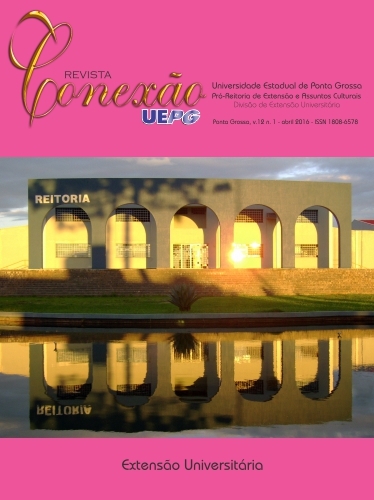IN-SERVICE TRAINING IN SCIENCE EDUCATION: DEVELOPING PROBLEM-SOLVING SITUATIONS – DOI: 10.5212/Rev.Conexao.v.12.i1.0004
DOI:
https://doi.org/10.5212/Rev.Conexao.v.12.i1.0004Keywords:
Science Education, Teacher Training, Problem-Solving Methodology.Abstract
In this article we present a teacher training experience developed at an in-service training for Basic Education. The purpose was to provide the Science Education teachers with theoretical and practical background to work with Problem-Solving Methodology. The approach is based on the theories presented by Larry Laudan, John Dewey and Jerome Bruner, in order to discuss epistemological, pedagogical and psychological aspects of Problem-Solving. The problems developed by the participant teachers were analyzed according to their respective scientific areas, to the contents developed, as well as a set of dichotomies reported in the literature. The results of the training were the deepening of the theoretical knowledge of Basic Education teachers, the development of teaching material, the reflection on their professional practice, and the use of alternative teaching methodologies.Downloads
References
BRUNER, J. S. The process of Education. Harward University press Cambridge: 1966. 10ª Impressão.
BRUNER, J. S. Uma nova teoria da aprendizagem. Rio de Janeiro: Bloch, 1969.
BRUNER, J. S. Sobre o Conhecimento: Ensaios de mãos esquerda. São Paulo: Phorte, 2008.
DEWEY, J.(1938).Experiência e Educação. Tradução de Renata Gaspar-Petrópolis, RJ: Vozes. Petrópolis, RJ: Vozes, 2010.
ECHEVERRÍA, M. D. P. P.; POZO, J.I. Aprender a Resolver Problemas e Resolver Problemas para aprender. In: POZO, J. I. (org). A Solução de Problemas: Aprender a resolver, resolver para aprender. Porto Alegre: Artmed, 1998.
GIL -PÉREZ, D. New trends in science education. Int. J. SCI. EDUC, V18 Nº 8, p. 889-901, 1996.
GOI, M. E. J.; SANTOS, F.M.T. Formação de professores e o desenolvimento de habilidades para a utilização da metodologia de resolução de problemas. Investigações em Ensino de Ciências (Online), V.19, p.431-450, 2014.
LAUDAN, L. Progress and it's problems. Towards a Theory of Scientific Growth. London: outledge & Kegan Pau, 1977. 275 p.
LAUDAN, L. Science and relativism:some key controversies in the philosophy of science. Chicago: University of Chicago Press, 1990, 180 p.
MATTHEWS, M. R. Teaching the Philosophical and Worldview Dimension of Science.Science & Education, V 18 (6-7), p. 697-728, 2009.
NERY, B. K; MALDANER, O. A. Formação continuada de professores de química na elaboração escrita de suas aulas a partir de um problema. Revista Electrónica de Enseñanza de las Ciencias V. 11, n.1, p.120-144, 2012.
POZO, J. I.; CRESPO, M. Á. G. A Solução de Problemas nas Ciências da Natureza. In: POZO, J. I. (org). A Solução de Problemas:Aprender a resolver, resolver para aprender. Porto Alegre: Artmed, 1998.
POZO, J. I. (org)A Solução de Problemas:Aprender a resolver, resolver para aprender. Porto Alegre: Artmed, 1998.
WATTS, M. The Science of Problem-Solving- A Pratical Guide for Science Teachers. London: Cassell, 1991.
Downloads
Published
Issue
Section
License
a) Authors retain copyright and grant the journal right of first publication with the work simultaneously licensed under a Creative Commons Attribution License that allows others to share the work with an acknowledgement of the work's authorship and initial publication in this journal.
b) By submitting an article to the Revista Conexão UEPG and having it approved, the authors agree to assign, without compensation, the following rights to the Journal: the rights of first publication and the rights to redistribute the article and its metadata to the indexing and reference services that the editors deem appropriate.
c) Readers are free to transfer, print out and use the articles published in the Journal, as long as there is always explicit mention to the author(s) and to the Revista Conexão UEPG and as long as there is no alteration of the original work. Any other use of the texts needs to be approved by the author(s) and by the Journal.






